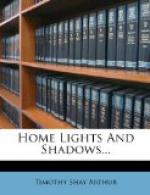The father’s intention of making him a merchant was, of course, opposed by the son, who chose one of the learned profession as more honorable—not more useful; a profession that would give him distinction—not enable him to fill his right place in society. In this he was gratified. At the time of his introduction to the reader, he was known as a young physician without a patient. He had graduated, but had not yet seen any occasion for taking an office, as his father’s purse supplied all his wants. His pursuits were mainly literary—consisting of essays and reviews for some of the periodicals intermixed with a liberal seasoning of pretty fair rhymes which rose occasionally to the dignity of poetry—or, as he supposed, to the lofty strains of a Milton or a Dante. Occasionally a lecture before some literary association brought his name into the newspapers in connection with remarks that kindled his vanity into a flame. Debating clubs afforded another field for display, and he made liberal use of the facility. So much for Charles Fenwick.
Of Adelaide Merton, we may remark, that she was just the kind of a woman to captivate a young man of Fenwick’s character. She was showy in her style of conversation, but exceedingly superficial. Her reading consisted principally of poetry and the popular light literature of the day, with a smattering of history. She could repeat, in quite an attractive style, many fine passages from Homer, Virgil, Milton, Shakspeare, Pope, Byron, Shelley, Coleridge, and a host of lesser lights in the poetic hemisphere—and could quote from and criticise the philosophy and style of Bulwer with the most edifying self-satisfaction imaginable—not to enumerate her many other remarkable characteristics.
A second visit to Adelaide confirmed the first favorable impression made upon the mind of Fenwick. At the third visit he was half in love with her, and she more than half in love with him. A fourth interview completed the work on both sides. At the fifth, the following conversation terminated the pleasant intercourse of the evening. They were seated on a sofa, and had been talking of poetry, and birds, and flowers, green fields, and smiling landscapes, and a dozen other things not necessary to be repeated at present. A pause of some moments finally succeeded, and each seemed deeply absorbed in thought.
“Adelaide,” at length the young man said in a low, musical tone, full of richness and pathos—“Do you not feel, sometimes, when your mind rises into the region of pure thoughts, and ranges free among the beautiful and glorious images that then come and go like angel visitants, a sense of loneliness, because another cannot share what brings to you such exquisite delight?”
“Yes—often and often,” replied the maiden lifting her eyes to those of Fenwick, and gazing at him with a tender expression.
“And yet few there are, Adelaide, few indeed who could share such elevating pleasures.”




